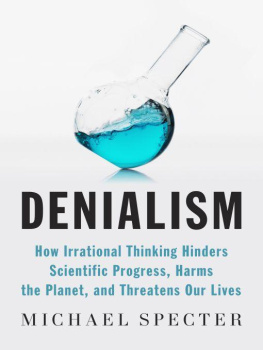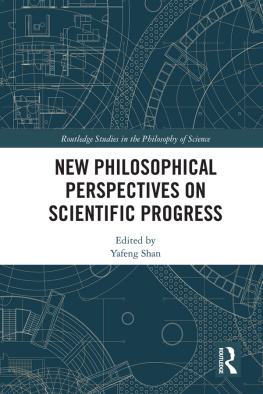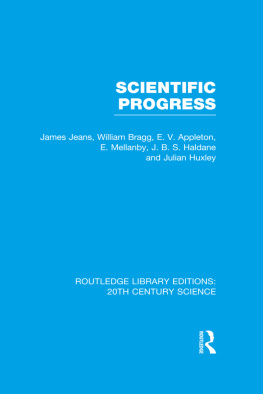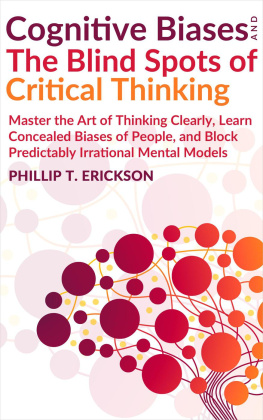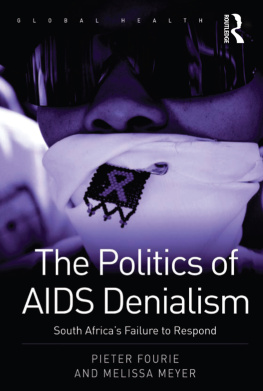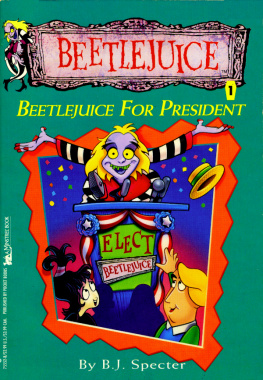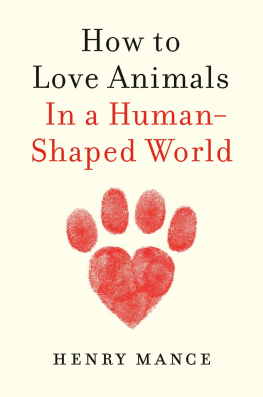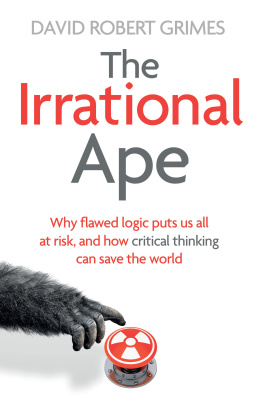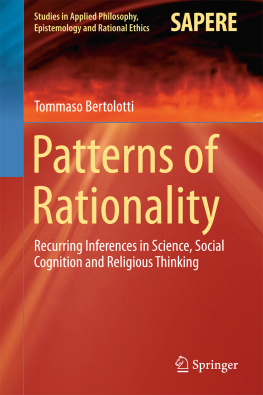ACKNOWLEDGMENTS
I have been lucky with editors throughout my career, but never more so than during my decade at the New Yorker. For much of that time I have worked with John Bennet, who, like all of the great ones, combines deft literary talent with unique psychiatric skills. I could not have made my way toward this book without his guidance. Among the many people at the magazine (past and present) who have also helped me I want to thank: Dorothy Wickenden, Henry Finder, Jeff Frank, Ann Goldstein, Elizabeth Pearson-Griffiths, Elizabeth Kolbert, Pam McCarthy, Sarah Larson, Julia Ioffe, Ame lia Lester, Lauren Porcaro and Alexa Cassanos.
Several friends and colleagues read early portions of the book, and a few even waded through all of it. Naturally, my sins (and even my opinions) are not theirs; but the book would have been immeasurably weaker without them. In particular, I would like to thank Daniel Zalewski and Meghan ORourke. Somehow, they each found time to read chapters, and then provide detailed suggestions for how to make them better. My friend Richard Brody read the book as I wrote it, with great enthusiasm but a stern eye for faulty logic and broken sentences. Suzy Hansen served not only as an able fact checker, but also as a demanding reader. Any mistakes that survived her attentionor anyone elsesare my fault completely.
At the Penguin Press, Ann Godoff and Vanessa Mobley embraced the book from the moment I spoke to them about it. My editor, Eamon Dolan, joined the process after it beganbut somehow seemed to understand what I was trying to do better than I did. He read thoughtfully, rapidly, and deeply. I dont know what more a writer could ask. I am also indebted to Nicole Hughes, Tracy Locke, Caroline Garner, and Leigh Butler, who doubles as a longtime friend.
Many friends have heard me drone on about this subject for yearsencouraging me all the while. (And also arguingwhich I tend to see as the same thing.) For their support and good cheer I would like to thank Gary Kalkut, Esther Fein, Gerry Krovatin, Sarah Lyall, Robert McCrum, Anne McNally, Richard Cohen, John Kalish, Jacob Weisberg, Deborah Needleman, Jacob Lewis, Sergey Brin, Anne Wojcicki and Alessandra Stanley.
When I was a child it often annoyed me that my parents, Howard and Eileen Specter, acted as if I could do anything. As I age, however, I have come to realize there is a role for blind devotion in this worldand I thank them for it profusely. My brother, Jeffrey, and his wife Yaelle, shouldered much family responsibility while I hid behind my laptop, and without that help there would have been no book.
Over the years, I have interviewed many people who have helped me form and refine the ideas in Denialism. It would be impossible to thank them alland by trying I would only fail. Others, quite sensibly, preferred to remain anonymous. I was aided greatly early in the project by a lengthy discussion with Juan Enriqueza man who knows denialism when he sees it and has rejected it with singular eloquence. I would also like to thank: Linda Avey, Esteban Gonzalez Burchard, Art Caplan, Rob Carlson, Joe Cerrell, George Church, June Cohen, John Elkington, Drew Endy, Ed Farmer, Tony Fauci, Jay Keasling, C. Everett Koop, Marie McCormick, Brian Naughton, Marion Nestle, Paul Offit, Neil Risch, Paul Saffo, Robert Shapiro, Eric Topol, Kari Stefansson and Eckard Wimmer.
Thousands of words of thanks have already been written on behalf of my friend and agent, Amanda Urban. They are insufficient. She combines intelligence, tenacity, vigor and loyalty - not to mention the occasional touch of furyin a bundle unlike any other on the planet. Anna Quindlen has been my friend since newspapers used hot typefortunately for me the friendship outlasted it. Anna, too, read early drafts and provided me with many notesfor which I am more grateful than she could know.
On my first day of work at the Washington Post, nearly twenty-five years ago, I noticed a tall man wandering aimlessly in the aisles, looking a bit like he belonged in another place. That place turned out to be the office of the editor of the New Yorker. David Remnicks leadership of the magazine has been praised by many othersand I can only add to the chorus. Nearly every Monday, proof of his gift turns up on newsstands and in hundreds of thousands of mailboxes. David is a remarkable editorbut an even better friend. Our conversationoften separated by continentshas lasted many years. He was the earliest and most consistent proponent of this bookand I thank him for that and for everything else. Denialism is dedicated to my daughter, Emma, who at the ripe old age of sixteen manages to teach me something new every day.
ABOUT THE AUTHOR
Michael Specter writes about science, technology, and global public health for the New Yorker, where he has been a staff writer since 1998. Specter previously worked for the New York Times as a roving correspondent based in Rome, and before that as the Timess Moscow bureau chief. He also served as national science reporter for the Washington Post as well as the New York bureau chief. He has twice received the Global Health Councils Excellence in Media Award, first for his 2001 article about AIDS, Indias Plague, and secondly for his 2004 article The Devastation, about the health crisis in Russia and the countrys drastic demographic decline. In 2002, Specter received the Science Journalism Award from the American Association for the Advancement of Science, for his article Rethinking the Brain, about the scientific basis of how we learn. His work has been included in numerous editions of The Best American Science Writing.
BIBLIOGRAPHY
Abramson, John, MD. Overdosed America: The Broken Promise of American Medicine. New York: HarperCollins, 2008.
Allen, Arthur. Vaccine: The Controversial Story of Medicines Greatest Lifesaver. New York: W. W. Norton, 2007.
Bacon, Francis. The New Organon; or, True Directions Concerning the Interpretation of Nature. London, 1620.
Barnes, Barry, and John Dupr. Genomes and What to Make of Them. Chicago: University of Chicago Press, 2008.
Basalla, George. The Evolution of Technology. Cambridge, UK: Cambridge University Press, 1988.
Bausell, R. Barker. Snake Oil Science: The Truth about Complementary and Alternative Medicine. Oxford, UK: Oxford University Press, 2007.
Carlson, Rob. Biology Is Technology: The Promise, Peril, and Business of Engineering Life. Cambridge, MA: Harvard University Press, 2009.
Caruso, Denise. Intervention: Confronting the Real Risks of Genetic Engineering and Life on a Biotech Planet. San Francisco: Hybrid Vigor Press, 2006.
Chesterton, G. K. Eugenics and Other Evils. Seattle: Inkling Books, 2000.
Culshaw, Rebecca. Science Sold Out: Does HIV Really Cause AIDS? Berkeley, CA: North Atlantic Books, 2007.
Dawkins, Richard. The Selfish Gene. Oxford, UK: Oxford University Press, 1989.
Darwin, Charles. On the Origin of Species. London: John Murray, 1859.
Duster, Troy. Backdoor to Eugenics. New York: Routledge, 2003.
Ehrlich, Paul R. The Population Bomb. New York: Ballantine Books, 1968.
, and Anne H. Ehrlich. The Dominant Animal: Human Evolution and the Environment. Washington, DC: Island Press, 2008.
Fukuyama, Francis. Our Posthuman Future: Consequences of the Biotechnology Revolution. New York: Picador, 2002.
Galton, Francis. Hereditary Genius. Amherst, MA: Prometheus Books, 1869.
Gessen, Masha. Blood Matters: From Inherited Illness to Designer Babies, How the World and I Found Ourselves in the Future of the Gene.

